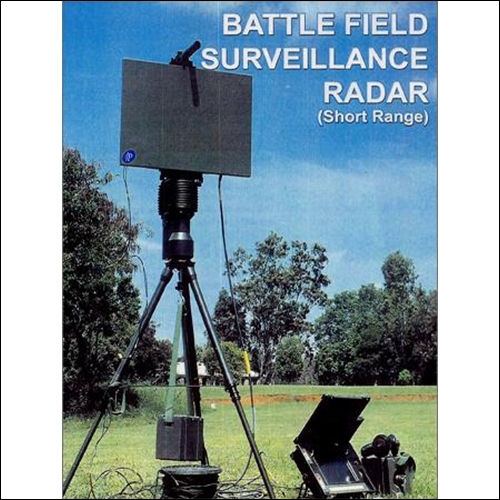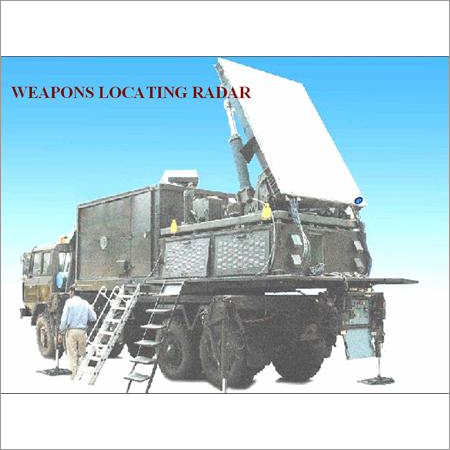Battlefield Surveillance Radar
Battlefield Surveillance Radar Specification
- Connectivity Type
- Ethernet, Wireless, Serial Communication
- Sensor Type
- Doppler Radar Sensor
- Technology
- Frequency Modulated Continuous Wave (FMCW), Pulse Doppler, Solid State Transmitter
- Remote Control
- Supported via wireless interface
- Application
- Border Security, Battlefield Surveillance, Intrusion Detection, Perimeter Security, Military Operations
- Screen Resolution
- Typically VGA on companion console
- Image/Video Quality
- Detection and mapping display
- Output Formats
- Standard digital interface for radar data (Ethernet, Serial)
- File Compatibility
- Digital data export supported
Battlefield Surveillance Radar Trade Information
- Minimum Order Quantity
- 1 Unit
- Packaging Details
- According to products
- Main Export Market(s)
- Australia, North America, Eastern Europe, Western Europe, Middle East, Central America, South America, Asia, Africa
- Main Domestic Market
- All India
About Battlefield Surveillance Radar
Driven by vision to achieve significant growth in the industry, we are engaged in manufacturing and supplying a wide range of Battlefield Surveillance Radar. These radars are used for detection of vehicles and missiles in battlefield. In various military vehicles and ships are radars are highly utilized. Our dexterous manpower uses finest quality materials and components, sourced from the most reliable vendors to manufacture the Battlefield Surveillance Radar.
Features:
- Used for locating short range radar
- Excellent electro-magnetic performance
- High - band width data link terminals
Portable Battlefield Surveillance Radar
Applications : Above Products include excellent electro magnetic performance for their intended applications providing upto 98% transmission efficiency depending on frequency
Some of these are
Naval Radomes : used in shipboard radar applications, High data rate communications systems, gunfire control and high - band width data link terminals.
Composite Refelectors : With surface tolerances of .005 inch are used to optimize gain and reduce side lobes in applications up to 44 GHZ. can be designed for ground - based, shipboard or airborne applications.
Architectural Radomes : Antennas on building roofs from the weather. Materials and Construction : Hi-Tech advanced composites and products are made from reinforcements such as Fibre Glass, Quartz, Graphite and along with matrices such as polyester, epoxies etc. Also the core materials such as honey comb and foams.
Different materials are available for different applications. Sizes : We design components & structures based on advanced composite to any configuration & size. We also make low radar cross section radomes and radomes utilizing frequency - selective surface technology.
Radomes can be fabricated of any size based on the customer requirement and can be designed accordingly. We can also suggest the customer the appropriate Radome to be used for their applications.
BAND Frequencies : HF, VHF, UHF, L, S, C, X, Ku, K, Ka, V, W, mm band etc. For any information please forward your Query and we will get back to you with the solution.
Advanced Surveillance Technology
The system leverages Doppler Radar Sensors combined with FMCW and Pulse Doppler technologies, enabling highly accurate detection and mapping of movement across vast terrains. Its solid state transmitter ensures durability and consistent performance even in challenging environments.
Seamless Remote Control & Connectivity
Remote control is enabled via wireless interface, allowing operators to manage and monitor radar operations from a secure distance. Its multi-interface outputs (Ethernet, Wireless, Serial) permit easy data export and integration with existing security infrastructures.
Versatile Applications in Defence & Security
Perfectly suited for border security, battlefield surveillance, perimeter protection, and military operations, this radar system is tailored to address varied defense requirements. Its digital export capability supports data management and quick situational responses for tactical teams.
FAQs of Battlefield Surveillance Radar:
Q: How does the Battlefield Surveillance Radar enhance security operations?
A: The radar provides real-time detection and mapping capabilities using advanced Doppler sensor technology, enabling faster identification and response to unauthorized intrusions or movements in sensitive areas.Q: What technology is used for detecting movements and threats?
A: It uses Frequency Modulated Continuous Wave (FMCW) and Pulse Doppler radar techniques, which are highly effective for identifying and tracking movement even under adverse weather or terrain conditions.Q: Where can this radar system be deployed for optimal performance?
A: The system can be installed across border areas, military bases, sensitive perimeters, and field operation zones to ensure comprehensive surveillance and security coverage.Q: When is remote control via wireless interface most beneficial?
A: Remote control offers significant value in hazardous or inaccessible areas, allowing operators to monitor and adjust radar functions without direct physical contact, thereby increasing operational safety.Q: What is the process for exporting detection data from the radar?
A: Detection and mapping data can be digitally exported through standard Ethernet, serial, or wireless interfaces, simplifying data analysis and sharing with command centers and decision-makers.Q: How is image and video quality managed on the radar system?
A: Visuals are displayed in VGA resolution on a companion console, focusing on clear detection and mapping graphics rather than high-definition video to prioritize functional surveillance over entertainment quality.Q: What are the main benefits of integrating this radar with existing security infrastructure?
A: Key benefits include enhanced situational awareness, quick data transfer to support tactical decisions, compatibility with digital export standards, and flexible deployment in diverse operational scenarios.

Price:
- 50
- 100
- 200
- 250
- 500
- 1000+
More Products in Surveillance Radar Category
Weapon Locating Radar
Minimum Order Quantity : 1 Unit
Output Formats : Digital radar data streams, standard military communication protocols
Connectivity Type : Ethernet, Wireless (secured military networks), Fiber optic interfaces
Remote Control : Other, Yes; supports remote operation and monitoring from command post
Sensor Type : Other, Phased Array Radar

 Send Inquiry
Send Inquiry



